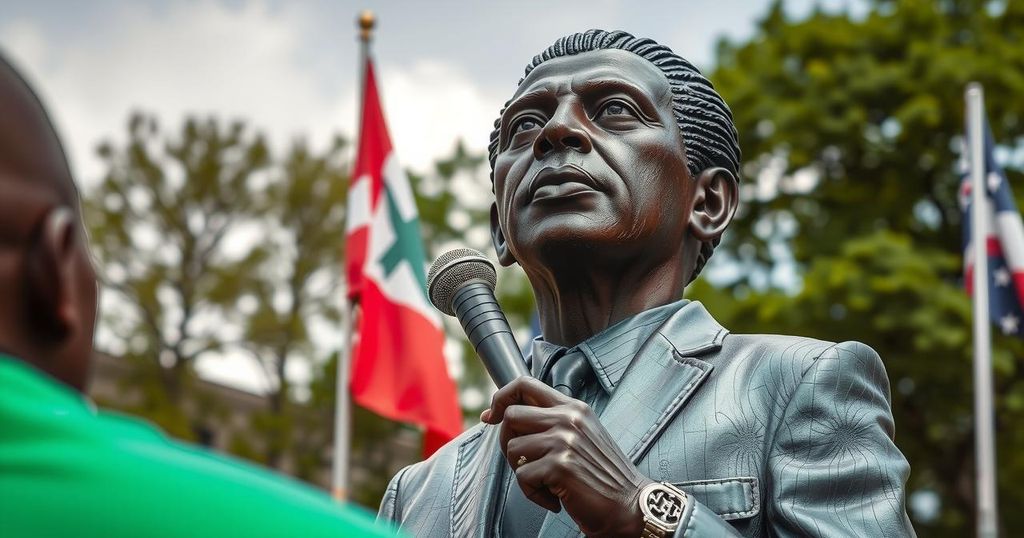The Central African Republic has erected a statue of Wagner Group leader Yevgeny Prigozhin to honor his role in stabilizing the nation. Despite its rich natural resources, the CAR struggles with poverty and conflict, seeking military support from Russia to combat internal strife. The statue symbolizes the deepening ties between CAR and Russia and raises questions about sustainable governance in the region.
The Central African Republic (CAR) has commemorated its alliance with Russia by unveiling a monument in honor of Yevgeny Prigozhin, the deceased leader of the Wagner Group, and his associate Dmitriy Utkin in the capital city of Bangui. This gesture signifies CAR’s appreciation towards Russia for its role in maintaining stability in the region, particularly since the arrival of Russian military forces in 2017, which have reportedly contributed to reducing the threat from rebel groups.
Despite possessing significant natural resources, including diamonds and gold, the CAR has struggled with poverty and conflict, facing a series of civil wars influenced by power struggles and ethnic tensions. The Wagner Group’s presence has been framed as essential for security, enabling the CAR government to protect its officials and engage in profitable trade of natural resources.
The statue depicts Prigozhin in tactical attire, equipped with a walkie-talkie, while Utkin is shown with an AK-47, symbolizing their roles in ensuring security in the region when they perished in a plane crash in August 2023. Although the Wagner Group has rebranded itself to Corps Africa, its operations in CAR continue under the Wagner name. President Faustin-Archange Touadéra’s government has been proactive in solidifying ties with Russia, seeking military support to combat internal conflicts and enhance national security.
Critics, however, have raised questions about the implications of such partnerships, advocating for regional solutions to security challenges without reliance on foreign military aid. Despite the economic deficits, the CAR leadership remains committed to leveraging its resources in exchange for security support, influencing other nations in the Sahel region to enter similar agreements amid financial crises.
Overall, the CAR remains a crucial point of interest for both Russian engagements and Western observers, as it navigates issues of sovereignty, resource management, and international relations, while grappling with the legacies of colonialism and ongoing instability that threaten its development prospects.
The Central African Republic’s history has been marked by political instability and economic hardship, despite its vast mineral wealth. After gaining independence from France in 1960, the nation has endured a succession of autocratic leaders and civil wars, which have impeded its development. The arrival of Russian military support beginning in 2017, primarily through the Wagner Group, was framed as a strategic move to restore peace and prevent the rise of armed groups that have historically disrupted governance. The statue honoring Prigozhin and Utkin represents a formal acknowledgment of Russia’s role in helping the CAR mitigate its security issues while navigating complex international relationships amid the legacy of colonial exploitation.
The unveiling of the statue in honor of Prigozhin and Utkin illustrates the CAR’s deepening ties to Russia, reflecting its reliance on foreign military support to ensure stability. Despite the nation’s rich resources, it remains one of the poorest globally, underlining the paradox of wealth coexisting with poverty and conflict. The CAR’s ongoing challenges emphasize the importance of balancing security partnerships with sustainable internal governance solutions to achieve long-term development. As other nations in Africa observe CAR’s strategy, the impact of such alliances could reshape regional dynamics concerning security and resource management for many years to come.
Original Source: moderndiplomacy.eu






